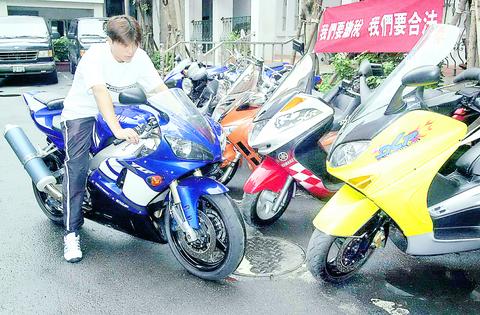Lawmakers from across party lines held a public hearing at the Legis-lative Yuan yesterday to urge the government to legalize motorcycles and scooters with engine volumes larger than 150cc that were imported before the ban on big bikes was lifted on July 1.
DPP legislators Wang Sing-nan (王幸男), Wang Shu-hui (王淑慧) and Mark Chen (陳唐山) joined KMT legislators Apollo Chen (陳學聖) and Yang Chiung-ying (楊瓊瓔) and PFP Legislator Chou Hsi-wei (周錫瑋) in hosting the hearing. They invited motorcycle owners and dealers as well as government officials to take part in a debate on the issue.
Importing or producing heavy-duty motorbikes was outlawed in January 1980 because of government concerns over energy conservation and a desire to protect the local motorcycle industry.

PHOTO: CHIANG YING-YING, TAIPEI TIMES
However, the ban did not make the motorbikes disappear from the streets.
According to statistics from Wang Sing-nan, there are at least 100,000 heavy-duty motorcycles and scooters on the road without legal registrations.
These bikes are presumed to have been assembled by mechanics from imported parts.
Wang explained that the importation of heavy-duty motorbikes was prohibited but importing their parts was legal.
Yin Cheng-pong (
However, a tax official from the Ministry of Finance explained that these bikes cannot be legalized unless the law is changed.
"The MOTC requires a motorcycle's tax receipt to register a vehicle. However, these bikes were taxed as parts instead of motorcycles when they were imported. As a result, the only way to legalize these bikes is to amend our regulations," said Liao Chao-hsiang (
"Whoever imported parts had to pay taxes as well," Wang Sing-nan said. "During the period these bikes were banned, it is my understanding that people tried all kinds of ways to import the parts and then asked local technicians to assemble the bikes."
"However, they would never be able to register their bikes because they were originally taxed as parts instead of bikes," he said.
The MOTC began issuing dri-ver's licenses and vehicle registrations for bigger motorcycles and scooters again on July 1, after the ban was lifted. However, the new regulations do not legalize the 100,000 or so bikes imported before the ban was lifted.
"The 100,000 motorbikes should be allowed to be made legal since their owners paid tax on them when they imported the parts," Wang Sing-nan said. "As taxpayers, they also have the right to register their vehicles."
Liao implied that the process to legalize such motorbikes would be complicated and time consuming.
"It is like trying to get a legal photo identification card for a stowaway," he said.
MOTC's Department of Motor Vehicles divides motorcycles and scooters into three categories: scooters with engines smaller than 50cc, motorcycles and scooters with engines between 51cc and 250cc and motorcycles and scooters with engines bigger than 250cc.
Ling Te-tsai (

RESOLUTIONS DEBATE: Taiwan’s allies said that UN and WHA resolutions cited by China and other nations ‘do not determine Taiwan’s participation in WHO activities’ A proposal to invite Taiwan to this year’s World Health Assembly (WHA) was rejected on Monday, resulting in Taipei’s absence from the annual meeting for a ninth consecutive year, although partners spoke up for Taiwan’s participation at the first day of the meeting. The first agenda item after the opening was a “two-on-two debate” on a proposal to invite Taiwan to participate at the WHA as an observer. Similar to previous years, two countries made statements in favor of the proposal, while two others expressed their opposition. Philippine Secretary of Health Teodoro Herbosa, president of the 78th WHA, accepted the WHA General Committee’s

Palauan President Surangel Whipps Jr arrived in Taiwan last night to kick off his first visit to the country since beginning his second term earlier this year. After arriving at Taoyuan International Airport at around 6:30 pm, Whipps and his delegation were welcomed by Minister of Foreign Affairs Lin Chia-lung (林佳龍). Speaking to gathered media, the Palauan leader said he was excited and honored to be back in Taiwan on his first state visit to Taiwan since he was sworn in this January. Among those traveling with Whipps is Minister of State Gustav N. Aitaro, Public Infrastructure

Premier Cho Jung-tai (卓榮泰) on Friday laid out the Cabinet’s updated policy agenda and recapped the government’s achievements ahead of the one-year anniversary of President William Lai’s (賴清德) inauguration. Cho said the government had made progress across a range of areas, including rebuilding Hualien, cracking down on fraud, improving pedestrian safety and promoting economic growth. “I hope the public will not have the impression that the Cabinet only asked the legislature to reconsider a bunch of legal amendments,” Cho said, calling the moves “necessary” to protect constitutional governance and the public’s interest. The Cabinet would work toward achieving its “1+7” plan, he said. The

Nvidia founder and CEO Jensen Huang (黃仁勳) hosted a dinner in Taipei last night with key Taiwanese suppliers to celebrate the successful mass production of the company’s new Blackwell AI systems. Speaking to the media earlier yesterday, Huang thanked Nvidia’s Taiwanese partners for their contributions to the company’s ecosystem, while also sharing his plans to meet with Taiwan Semiconductor Manufacturing Co (TSMC) founder Morris Chang (張忠謀). In response to rumors that Nvidia will launch a downgraded Hopper H20 chip for China in July, Huang dismissed the reports, saying, “That is not true.” He clarified that there